A sound truck drove through the streets of Oiapoque blasting out an invitation to a public hearing: “Oil and gas on the coast of Amapá – a debate about the future”. The message was enforced in the main square of this northern Brazilian city with a banner giving details of the event, which had been proposed by state deputy Inácio Monteiro Maciel (Democratic Labor Party) and was scheduled to take place on the afternoon of May 19, at the Joaquim Nabuco State School. The city’s main hotels were full, and most of the guests were people involved in producing the event, advisors to politicians and others interested in the opening up of a new frontier for oil exploration in the Amazon region.
In the lobby of one of the hotels, the speech given by the former federal deputy Antonio Feijão, a figure who is well-known in the area on account of his involvement in environmental violations and his links to illegal gold mining in the Amazon region, set the tone for the meeting: “Randolfe has come back to life politically speaking. He has strengthened the bonds among those in the state of Amapa’s Assembly. What he is saying is: Marina Silva does not want the oil that provides work for the people of Amapá.
Feijão was referring to Senator Randolfe Rodrigues, who is the government’s leader in Congress. He recently left the political party Sustainability Network (Rede Sustentabilidade), the same as the Minister of the Environment and Climate Change, Marina Silva, and repositioned himself in favor of oil exploration at the so-called Foz do Amazonas (Mouth of the Amazon River), with an eye on the 2026 election. The senator took this decision shortly after Ibama’s president, Rodrigo Agostinho, on May 17, denied a license to drill in the area, which had been requested by Petrobras.
At breakfast, on the day of the hearing, Feijão was already in full swagger and made predictions as to how long Marina Silva would remain in charge of the ministry, during conversations with guests and colleagues in the region. Among the state of Amapa’s politicians the betting is that Marina will not survive more than 90 days. The forecast is shared by the entire political and economic elite of northern Brazil. They all believe Marina Silva will fall and Randolfe, is likely to be the next Minister of the Environment and Climate Change thanks to his abandonment of an environmental cause.
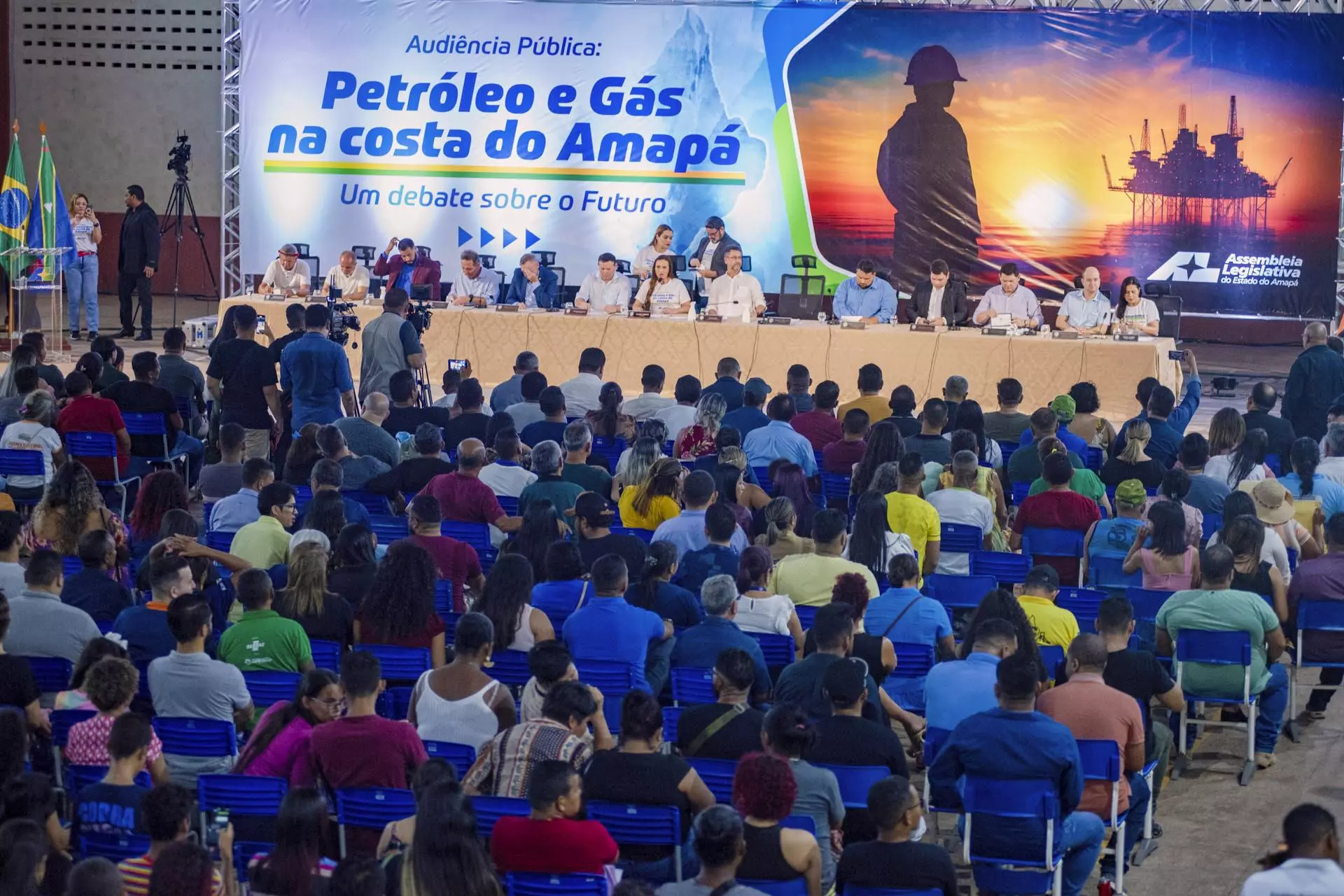
At the public hearing, congressmen from the state of Amapá championed the denialist theory that opening up a new front for oil exploration in the Amazon region is to defend the region’s future. Photo: the state of Amapá’s Legislative Assembly
Shoulder to shoulder in the battle to mislead the public
With feelings running high two days after Ibama denied the license for offshore drilling in Block 59, Amapá’s politicians were, in unison, promoting and spreading the narrative that the federal government’s environmental agency was committing “a crime”. In five hours of speeches and debate, they totally ignored the fact that Ibama follows technical guidelines aimed at preventing an environmental catastrophe.
According to most of the local politicians, the environmental agency’s crime was to “deny Amapá the chance to develop and to generate jobs and income”. The public hearing should have been a chance to present and debate the consequences of oil exploration in the region. However, instead of this it was a platform for disinformation spread by the state of Amapa’s politicians and also to launch brutal attacks on Minister Marina Silva and Ibama’s president, Rodrigo Agostinho.
“Ibama committed a crime against the Brazilian people,” declared Senator Davi Alcolumbre (Brazil Union party), former president of the Senate, in a video exhibited at the event’s opening ceremony. “What Ibama’s president did was to deny the people the right to know what they have in their territory,” reiterated the senator, stating afterwards that Agostinho’s decision was “ill-timed”.
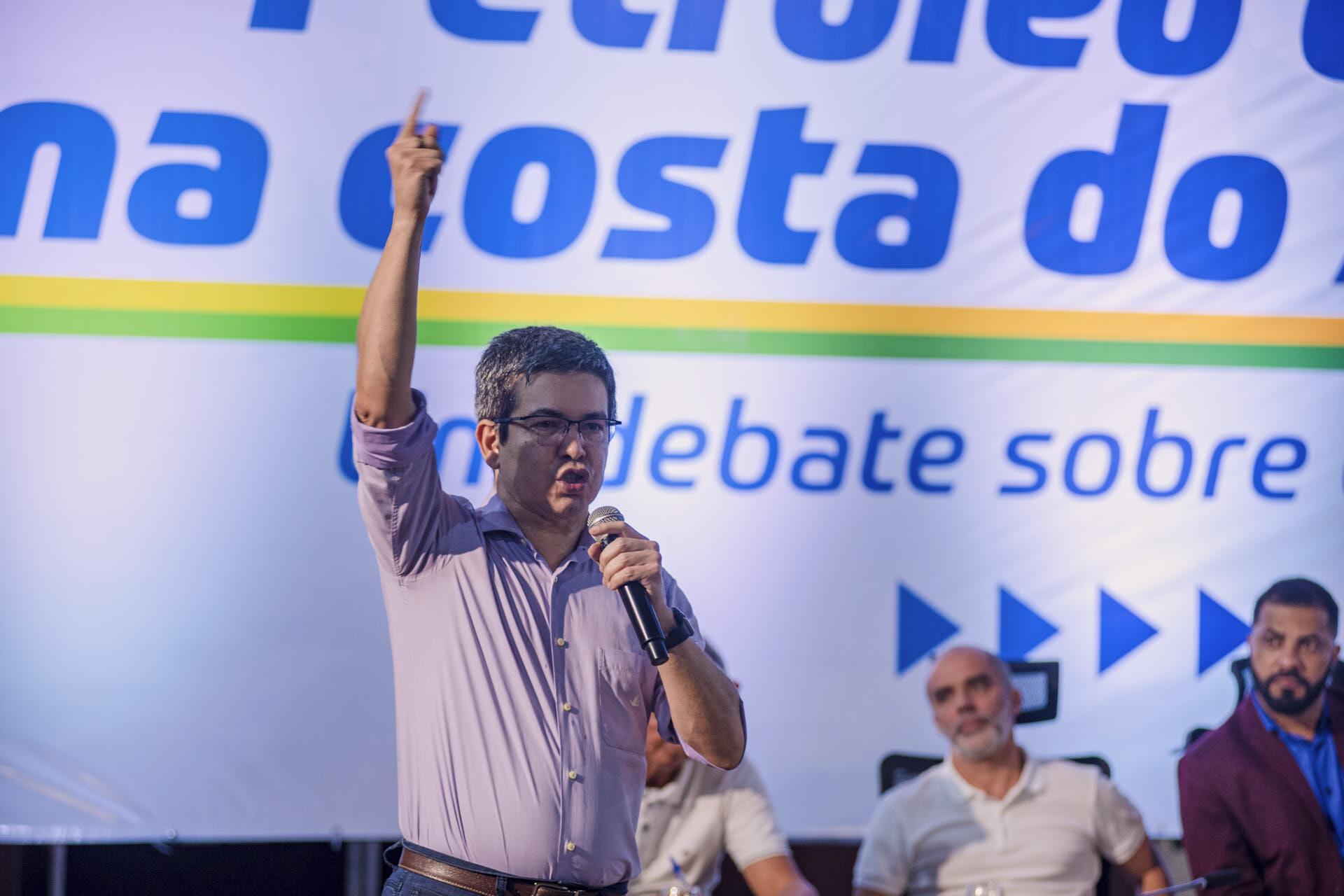
Randolfe discredited the president of the Brazilian Institute of the Environment and Renewable Natural Resources (Ibama), Rodrigo Agostinho, who denied the license for Petrobras to drill an oil well at the mouth of the Amazon River. Photo: Amapá’s Legislative Assembly
Not to be outdone, Randolfe shouted into the microphone that the people of the state of Amapa should have been consulted and that such a decision could not be made by “a bureaucrat with light-colored eyes,” in reference to Rodrigo Agostinho, who has blue eyes. The senator went on to declare “that he did not learn about the environment on Faria Lima [the city of São Paulo’s financial center] or in a university classroom,” but from the indigenous people of Amapá. However, he did not explain how his environmentalism combines with the impassioned defense of oil extraction in a region that exhibits a high level of socio-environmental vulnerability.
At the public hearing neither Alcolumbre nor Randolfe explained why Petrobras and the Ministry of Mines and Energy are going to such lengths to avoid carrying out a strategic environmental assessment, despite their assurances that oil exploration on the equatorial margin is safe. Given their confidence, they ought to be eager to resolve this issue and prove that it is safe, which would enable them to move forward not just with Block 59, but with all the other applications. This begged the question why Alcolumbre and Randolfe are not insisting on doing the Strategic Environmental Assessment, which could prove that oil exploration in the region is viable, and in this way, provide peace of mind to the local population, outside investors and neighbouring states.
The two politicians from the state of Amapá who are known nationwide preferred not to have this debate at the public hearing. On the contrary. Randolfe, who up until yesterday was one of Marina Silva’s allies, insisted on the proposition that Amapa’s population should have been consulted regarding the approval of the license. And that the hearing was an act on behalf of the people of the state of Amapá. However, the argument about consultation is groundless, as has been explained over and over by Ibama’s specialists as well as by Agostinho himself.
In the environmental licensing process, the “entrepreneur” is only obliged to hold public hearings in order to inform the population of the area affected by the project and resolve any doubts they may have, which was what occurred in the case of Block 59. What Ibama has explained is that this phase of analysis is exclusively a technical one, so it is under no obligation to hear the region’s politicians for example. And this is exactly to avoid interference and contamination of a delicate and complex debate that should only be guided by science, on behalf of the common good.
At the event, Senator Lucas Barreto (Social Democratic Party) said Amapá’s federal and state caucuses are more united than ever to overcome what he called “hidden forces” that would try to block the state’s development. “We will defeat the hidden forces,” he guaranteed. “Amapá is the victim of a war of self-importance between the Ministry of the Environment and Petrobras,” chanted the senator. Barreto said that he, Randolfe and Alcolumbre, the state of Amapá’s three representatives in the Senate, are “shoulder to shoulder in this war.”
Senator Barreto declared that, together with Alcolumbre, he will do whatever is necessary for Randolfe to take over at the Ministry of the Environment. He called into question Marina Silva’s past and identity as an Amazonian, due to the fact that she chose the state of São Paulo when she ran successful for election as a federal deputy in 2022. Marina, the daughter of rubber tappers from the state of Acre became an environmentalist alongside Chico Mendes and who has a long history of defending the environment. She stepped down as a deputy in order to take charge of the ministry, at the request of President Luiz Inácio Lula da Silva and acted as one of the main guarantors of his victory over Jair Bolsonaro.
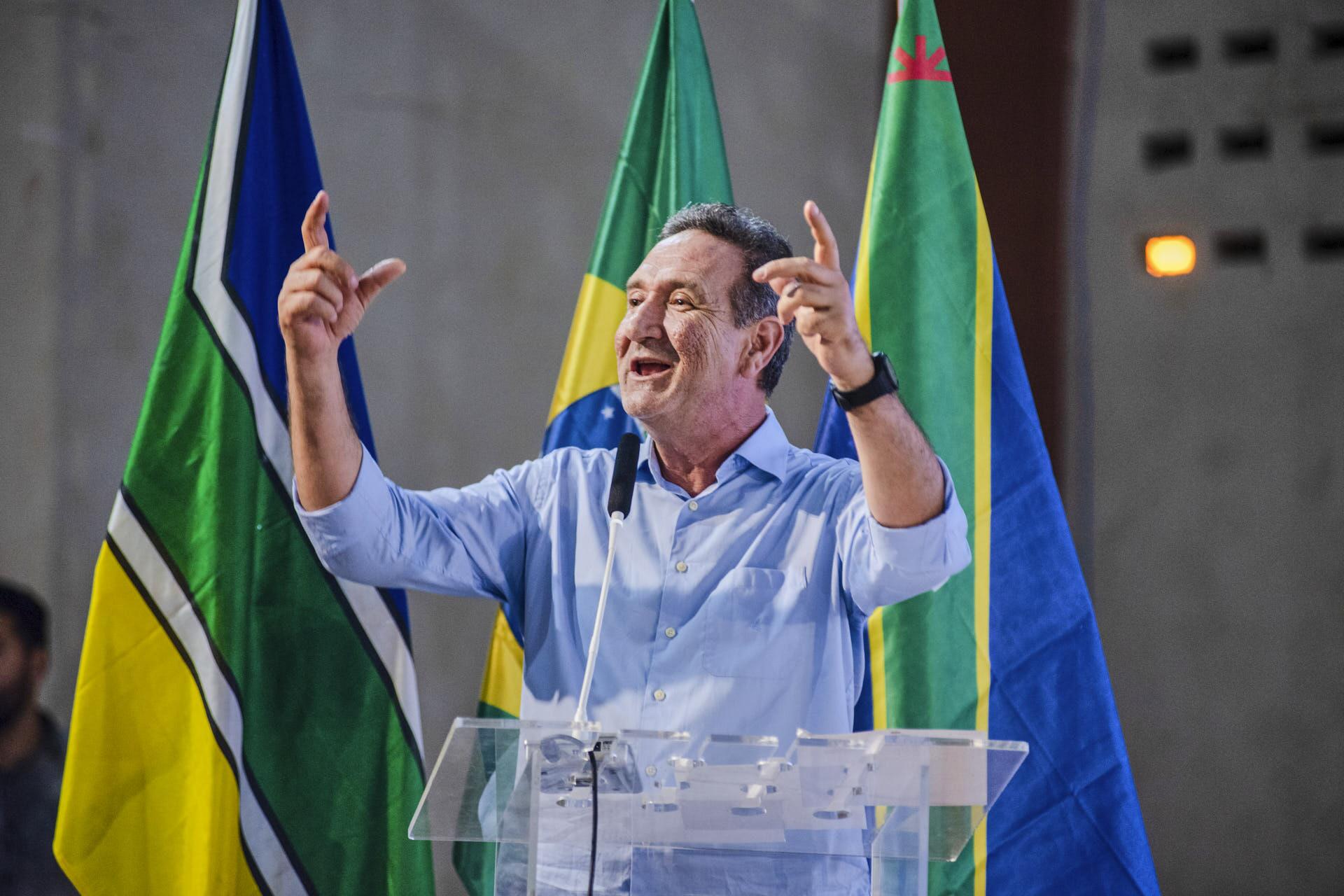
Senator Lucas Barreto advocated that his colleague, Randolfe Rodrigues, should take over Marina Silva’s position at the Ministry of Environment and Climate Change. Photo: the state of Amapá’s Legislative Assembly
Echoing the attack on the minister, state deputy Jory Oeiras (Progressives party) said Marina is linked to international NGOs and no longer defends the people of the Amazon region – another very common complaint among local politicians, who always try to link the third sector, in an ambiguous way, to spurious international interests in the region. Ironically, they welcome the large transnational mining corporations with open arms.
Ibama identified three key factors that justified denying the license for Block 59. The first was the insufficiency of the Oiled Wildlife Protection Plan, part of the Individual Emergency Plan, which is the company’s action planning in response to an eventual oil spill at sea. In addition, Ibama stated there are flaws and insufficient measures in the social communication plan related to the region’s indigenous communities. Last but not least, when denying the license, the president of the Brazilian Institute of the Environment and Renewable Natural Resources (Ibama) cited the lack of any Sedimentary Area Environmental Assessment (AAAS) for Brazil’s equatorial margin, which includes Foz do Amazonas. The AAAS is an instrument created in 2012 in order to assess which areas in a region are suitable or not for oil and natural gas exploration. This assessment should have been commissioned by the ministries of the Environment and Mines and Energy prior to the auction of Block 59 and others on the equatorial margin in 2013, but this did not occur. The AAAS can provide greater security for the environmental licensing process conducted by Ibama.
Using indigenous participants for social media
In the hall where the public hearing took place, the first rows of chairs were reserved for the region’s indigenous people. It was a clear strategy so politicians could greet them while their advisors recorded it, giving the impression this event was in defense of the environment and original peoples. The scene was designed to convince public opinion that traditional communities are in favor of oil exploration. It was also an attempt to discredit Ibama’s claim that the project presented by Petrobras contained flaws in communication with the region’s indigenous communities.
An Indigenous man, Ramon Karipuna introduced himself as a representative of the region’s 60 leaders. “The Indigenous people are not against the enterprise, but we need the activity to be carried out in the best possible way, without being contaminated. We need to live in peace in our territory,” he claimed. However, Ramon’s portrayal was not a true reflection of the real situation. Caciques consulted by SUMAÚMA, under the condition that their names would not be mentioned – for security reasons, at their own request – said that they had chosen to boycott the event because the invitations were sent out at the very last minute, meaning they didn’t have enough time to discuss the matter with their communities.
According to the protocol of the Council of Caciques of the Indigenous Peoples of Oiapoque (CCPIO), the communities should be invited to hearings at least 15 days in advance, so that all the leaderships, who represent 53 villages, have time to discuss a common stance. “Mobilizing our leaders from the most distant villages and from all over the territory is not easy. There are places that are hard to get to. With two days’ notice there is no way to mobilize, meet and align our discussion in order to take part in a hearing of this size. It is impossible,” said one of the caciques, who asked that his name not be mentioned in this article for fear of strong political pressure in the region.
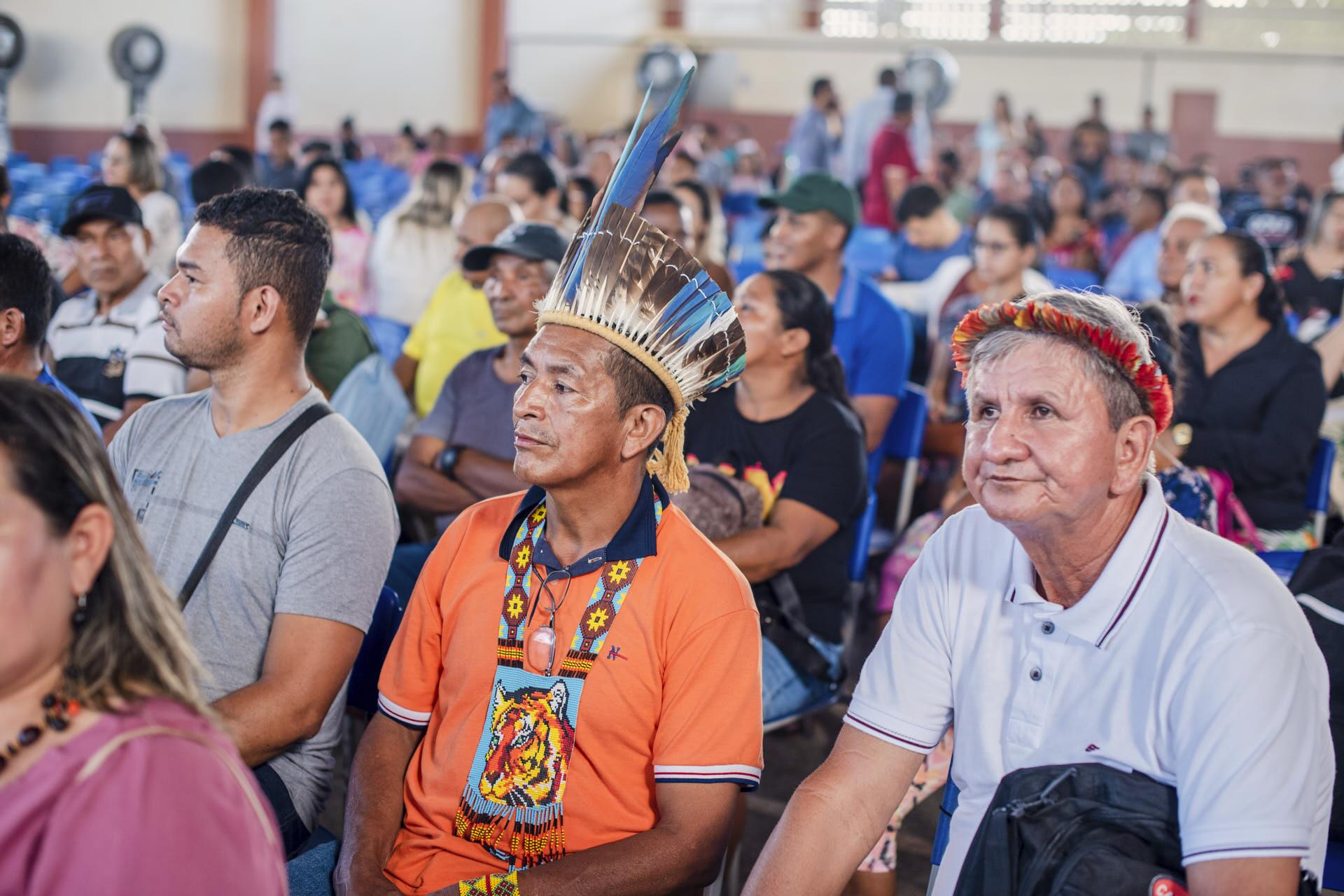
Ramon Karipuna said he represented 60 of the region’s leaders and that the Indigenous people are not against the enterprise, but they want to be sure that there is not going to be any contamination of nature. Photo: the state of Amapá’s Legislative Assembly
Most of the audience at the public hearing in Oiapoque were politicians and supporters of the Petrobras oil project. Among them were the state’s governor, Clécio Luís (Solidarity party); the CEO of Companhia Maranhense de Gás, Allan Kardec, representing the governor of the state of Maranhão, Carlos Brandão; the state of Pará’s state deputies: Iran Lima (Brazilian Democratic Movement party), Luth Rebelo (Progressives) and Nilton Neves (Social Democratic Party); the interim CEO of the EPE – Empresa de Estudos Energéticos (Energy Studies Company), Angela Livino; and the mayor of Oiapoque, Breno Lima (Brazilian Labor Renewal Party). At no time was any space opened up for presenting contradictory arguments or showing the inconsistencies of the oil-well drilling project at the mouth of the Amazon and its risks to wildlife, flora, and the local population, as identified by Ibama. Instead, the message of the event was that the decision taken by Ibama was a political one, and did not take into account Oiapoque’s and the state of Amapá’s economic development. Without any counterpoints, the event became a platform for misinformation about local biodiversity and the project.
Oil-hungry “environmental slaves”
Ignoring the finding of the scientific community, Senator Lucas Barretos stood on the event’s rostrum and declared that there are no reefs in the basin of the mouth of the Amazon River, just fossils. When arguing in favor of drilling in the area, he said Amapá already fulfills its environmental obligations, because it is the state with the greatest number of conservation units in Brazil. “What good did it do to be a preserved state? What good did it do to do our homework on the environmental issue? Nobody pays us for this. Nobody sees us. Nobody pays us to be slaves to the environment.” He went on: “We are the richest state on the planet in environmental terms, but our people are on top of the wealth, in poverty, contemplating nature. Looking at the tree, scenic beauty, doesn’t put food on the table. The people of the Amazon need more than sunshine to live. The solution lies on the coast of Amapá,” said Barretos.
Regarding the existence of the Amazonian reefs, the biologist Vinicius Nora, who has a master’s degree in ecology and is manager of Oceans and Climate at the Arayara International Institute explained to SUMAÚMA that the region’s abundance can be observed, for example, from the massive importance of fishing for snapper, which is a reef fish. For Nora, “the claim that ‘all there are is fossils’ is just another example of misinformation aimed at minimizing the importance of the Amazonian reefs.” The biologist stressed that even the oil companies acknowledge the existence of the reefs. And he defends the idea “that it is necessary to set up protection mechanisms, such as the creation of an extractive reserve or another category of conservation unit, in order to preserve people’s livelihoods as well as this important Amazonian ecosystem.”
The politicians who took the rostrum tried to downplay the likely impacts of the venture to the region, stressing the issue of the distance from the exploration point of Block 59 to the mouth of the river. “It is closer to Guyana than to Brazil,” claimed Randolfe, deliberately overlooking the fact that location does not provide any guarantee of safety, on account of the speed of marine currents. The concern of civil society organizations is that discussions where there is no transparency or commitment to the truth conceal the oil and gas sector’s speculation in the region, where the National Petroleum Agency has included 328 exploratory blocks. All of the potential developers are waiting for a precedent to be set at Block 59.
(*) The journalist traveled to Amapá at the invitation of Instituto Arayara and was commissioned by SUMAÚMA to write this report about the public hearing in the municipality of Oiapoque.
Text updated as at 13h30 (Brazilian Time)
We made a mistake: in the original version of this report, we said that Petrobras had failed to deliver the Sedimentary Area Environmental Assessment (AAAS). However, it is not the company that is responsible for commissioning the study, but rather the Ministries of the Environment and Climate Change and of Mines and Energy.
Spell check (Portuguese): Elvira Gago
Translation into Spanish: Meritxell Almarza
English translation: Mark Murray
Photography editing: Marcelo Aguilar, Mariana Greif and Pablo Albarenga
Page setup: Érica Saboya
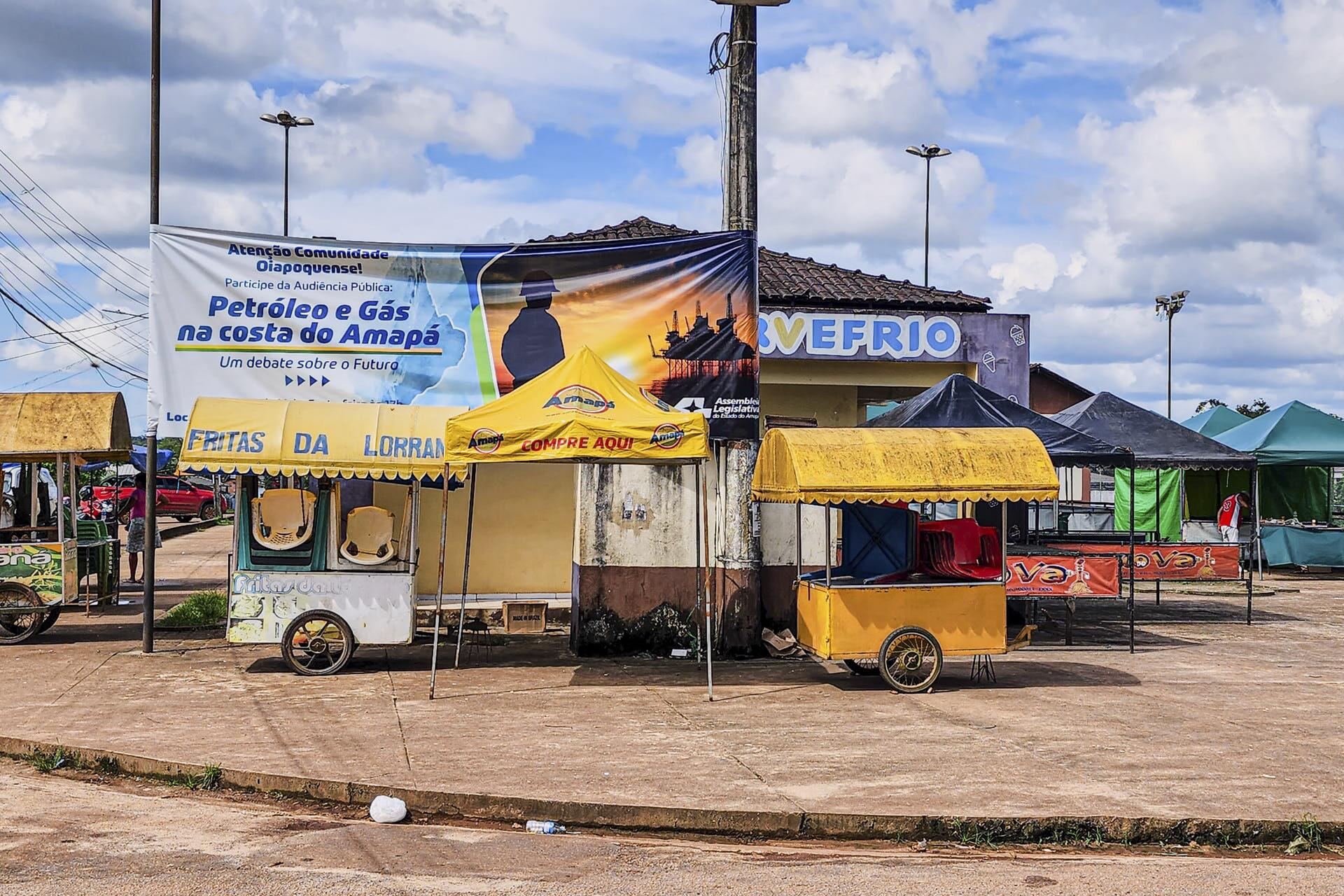
Politicians scattered banners all over the municipality inviting the population to the public hearing “Oil and gas on the coast of the state of Amapá – a debate about the future”, in Oiapoque. Photo: Leandro Barbosa





